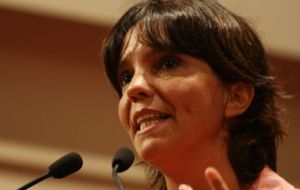MercoPress. South Atlantic News Agency
Argentina claims IMF wants rich world’s “stagnation” exported to developing countries
 Central bank president Mercedes Marcó del Pont
Central bank president Mercedes Marcó del Pont “The IMF wants to make us believe that the policies which caused the crisis are now going to be part of the solution”, said Argentina’s Central bank president Mercedes Marcó del Pont following the opening of the IMF/World Bank annual assembly.
Marcó del Pont met in Washington with the presidents of the Spanish and Brazilian central Banks, Miguel Fernández Ordóñez and Henrique Meirelles, respectively, with whom she analyzed the international economic scene and the risks involved in insisting on formulas that have already failed in order to overcome the global crisis.
“The IMF now recognizes that emerging countries are facing the inflow of financial capital, but before this situation it suggests the market should be the one to determine the type of exchange. In reality, what the Fund is promoting is an appreciation that would have, as consequence, developed countries exporting their stagnation to emerging countries,” Marcó del Pont remarked, and she added: “But there is consensus among emerging countries to not allow this to happen.”
“In emerging economies, there is a clear conscience of the danger that appreciation implies and the risks involved in the inflow of short-term capitals, and that is why we're not going to allow the developed world to use our dynamic, internal markets as a lifesaver,” the CB head said.
Marcó del Pont highlighted, in this sense, the relevance and opportunity of the decision made by President Cristina Kirchner to keep financial capital inflows under control that governs Argentina, ignoring the claim made by some market sectors.
“Some months ago, Argentina proposed these issues and was alone, and now there is an ever-increasing homogeneity in warning of the risks implied in speculative capital movements,” she assured.
Meanwhile Director of the IMF's Western Hemisphere Department Nicolás Eyzaguirre confirmed he is scheduled to soon meet with Argentine Economy Minister Amado Boudou, which he assures will take place in a “pleasant and positive manner as usual.”
Regarding the possibility of an eventual joint revision of Argentina's economy, Mr. Eyzaguirre said Argentina had yet not replied with regards to an eventual reviewing of Chapter Four. “However - he clarified- conversation with Argentine authorities is swift and constant, as well as our observation of economic developments. Therefore, our relationship continues despite not having discussing Chapter Four yet.”
Eyzaguirre concluded by adding that even tough it is mandatory for member countries to abide by these chapters, it's up to the members to establish how countries must comply with them.




Top Comments
Disclaimer & comment rules-

-

-

Read all commentsArgentina tends to subject whatever it fears to vocal attack ..... so why does it fear the IMF ??
Oct 09th, 2010 - 01:19 am 0I cannot understand why Argentines let their governments defile their wonderful country and make them a laughing-stock (they are certainly not, I love Argentina and the people). I read some very good commentary at Mainline Security - never sure if these guys really like the government or their articles are somewhat tongue-in-cheek.
Oct 09th, 2010 - 12:41 pm 0http://www.bastay.com/buenos-aires-real-estate/argentine-budget-2011-amado-boudou-deserves-dialouge-not-just-opposition
Hoytred: They fear an IMF audit because it will expose their manipulation of economic figures. Inflation has been 3-4X greater than they have been reporting for the last 7 years! When they did the initial swap of the defaulted bonds most of the new bonds were tied to GDP and Inflation for the interest payments. When the IMF audits the corruption will be exposed and Argentina will face Multi Billion $ domestic and international lawsuits for repayment of back interest that they can't afford.
Oct 09th, 2010 - 01:12 pm 0From what I understand they can pay the Paris Club debt in one payment and forgo the audit. I think the balance is about U$9B I don't know why they don't do that, it worked with the IMF loans. They must be getting pressured somewhere else too.
Commenting for this story is now closed.
If you have a Facebook account, become a fan and comment on our Facebook Page!